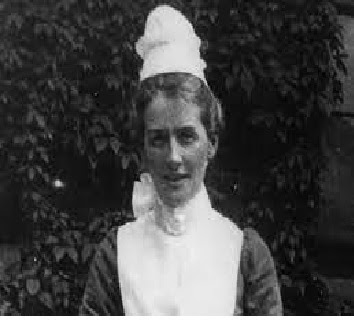Nurse Edith Cavell was the daughter of a
country parson. The Reverend Frederick
Cavell brought up his children to have care for those less fortunate than
themselves. Edith became a governess and
she didn’t start to train as a nurse until she was 35 and in 1910 she was
recruited to be matron of a newly established nursing school in Brussels.
When World War I broke out, she was visiting her widowed mother in Norfolk but she
returned to Brussels where she began sheltering British soldiers and getting
them to the neutral Netherlands. It wasn’t just Brits either: she
sheltered British and French soldiers and Belgians and French of military age.
She was arrested and charged with harbouring Allied soldiers. She was held in prison for 10 weeks, the last
two in solitary confinement. She admitted she had helped about 60 British and
15 French injured soldiers and about 100 French and Belgians of military age.
She made no attempt to deny the charges and she even told the court that
the soldiers she had helped escape thanked her in writing when arriving safely
in Britain. This established that she helped them escape to a country at war
with Germany. As the case stood, the
sentence according to German military law was death.
The German civil governor said that Edith should be pardoned because of
her complete honesty and because she had helped save so many lives, German as
well as Allied. However, the military governor of Brussels ordered that the
execution of Edith Cavell should be carried out immediately.
The night before her execution, she told the Reverend Stirling Gahan,
the Anglican chaplain who had been allowed to see her and to give her Holy Communion,
"Patriotism is not enough, I must have no hatred or bitterness towards
anyone. I have no fear or shrinking; I
have seen death so often it is not strange, or fearful to me!”
One of the first memorials to her was unveiled in October 1918, even before
the war was over when Queen Alexander opened a nurses’ home named after her in
Norwich.
.JPG)
.JPG)











.JPG)